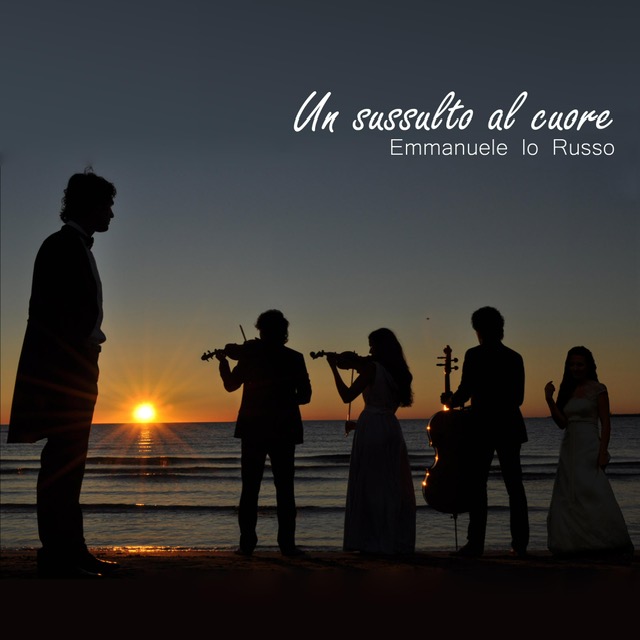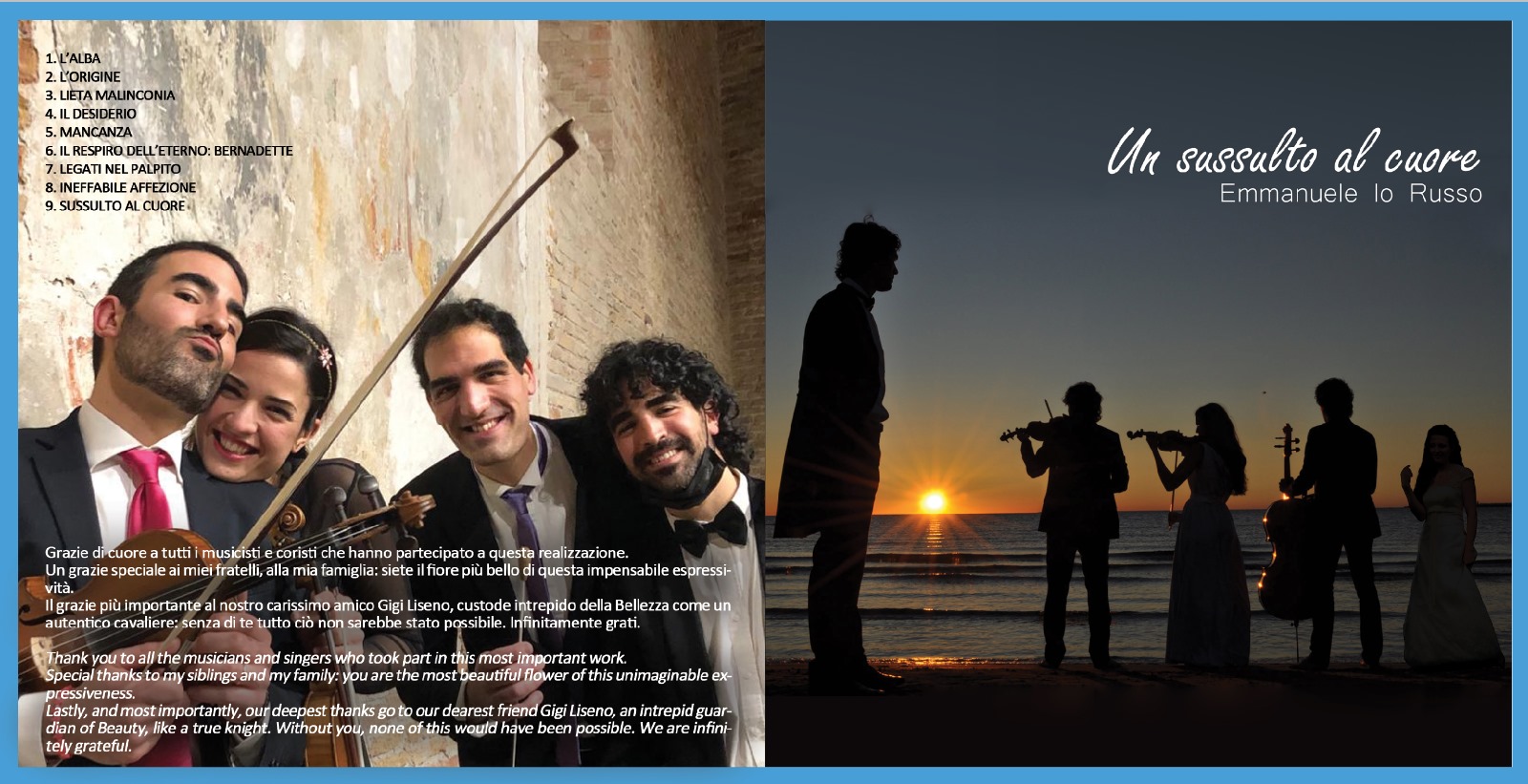

DAWN
In Vieste, from our living room’s large window overlooking the sea, this piece came to life. Dawn paints the first colours across the sky, the melancholy cry of seagulls mingles with the rhythmic rush of waves, and then – silence.
Look – the sun rises on the horizon, and gradually, a passionate melody awakens, celebrating the beauty of
creation now bathed in light.
What lights up my daily life? What is the dawn within my heart?
THE ORIGIN
The dialogue between the cello and violin reflects the new life born from the seal of infinite love in marriage.
The orchestra, with the energy of a lively jig, conveys the joyful celebration of the step taken. Suddenly, it pauses: a que-stion emerges in the central theme. What is the source and foundation of the affective bond? What renews and sustains every day what might otherwise fade into
routine over time?
Barbara’s voice heightens the intensity of this dramatic theme, reaching its ex-pressive peak, while the final chorus embodies the full humanity of the journey.
HAPPY MELANCHOLY
Placing my hands on the piano keys, this piece emerged in an instant, like taking a sip of water, amid the summer heat of Treviso. The first theme carries a quiet melancholy a silent wound born of the inability to love. Yet experience reminds me, again and again, that this is never the final word.
From this, the theme of gladness arises, revealing an immense and passionate longing etched into my heart that blossoms like a flower among the stones. It is this vastness that makes possible the loving entanglement of a happy melancholy.
DESIRE
Like gazing at a starry sky, my heart bursts into a love song through the soulful voice of the clarinet.
This piece expresses the renewed and overwhelming discovery of the desire to be happy, Though deeply personal, this counter with humanity a friendship made
possible nly by faith. Gradually the choir joins the clarinet’s
solo,weaving together until they become one at the climax.
“Desire” is an outpouring of emotion sparked by the intuition of a good so immense that to the heart it seems impossible- a total answer to the meaning of life.
LACK
The oboe’s opening solo, the pleading phrases of the cellos, and the inexorability imposed by the timpani: this is the cry of a deeply lived drama.
A profound yearning for totality surges forth – more intensely felt than ever before. Made familiar through the gaze of close friends, this longing gives rise to an extraordinary purity, which is why in the wake of the dramatic theme the theme of hope springs sweetly.
This hope is not expectation about the future but an answer to a vital question: Is there a relationship that fulfils everything, even the chasm of the most tragic and unforeseen drama?
The music swells, its phrasing growing broader and more resolute, like a river flooding into the sea, until it reaches the paradox: the theme of hope intertwines with the theme of drama. And here, at the climax, lies the miracle – the miracle of discovering fullness even in the heart of suffering, which becomes the source of humble certainty, of hope.
THE BREATH OF THE ETERNAL: BERNADETTE
The passage speaks of the preferential relationship in my life, the supreme instrument of all the steps taken: my sister Maria Bernadette. The opening freshness, expressed by the orchestra, is like the impetuous gallop of a horse along the seashore: What gives my steps boldness and certainty along the way?
A boundless sweetness! Then comes the second theme, proclaiming the vastness of a preferential love that opens wide to embrace the world.
Life takes on a new breath: immersed in affection, which continually relaunches to the meaning of living, everything softens and finds its own greatness.
The human voice conveys the eternity of this relationship: The soaring melodies of the chorus reflect my heart, which, when it glimpses Bernadette’s gaze, quivers with joy in recognizing the infinite.
BOUND IN THE PULSE OF LIFE
In “Bound in the pulse of life” lies the decision to intertwine my existence with yours, illuminated by the experience of a greater Good. A journey from Treviso to Ulm to visit my brother, Raffaele Pio, becomes a step along this path. After months apart, our first greeting quickly turns into a painful discussion that stings. A journey of 500 km, only to be met with the bitter discomfort of feeling out of place and out of time? Here, at the most bitter point, the music almost seems to stop. But this thought is swept away by an ater than freel, after the cool a line gre this embrace can lead to a “bond in the pulse of life” – a familiarity deeper than close kinship. So the cello begins anew, rising from its lowest register and surging into a bold, soaring theme as if it were a violin. To be the recipient of such an immense Good enables me to accomplish what I could never have imagined. The finale bursts forth with the exhilaration born of this love: friendship, a mutual and wholehearted rush toward the fulfilment of the heart, expressed by the human voice.
INEFFABLE AFFECTION
The horn’s solo is like the voice of a newborn, whispering the Beauty of being held in a mother’s arms: a friendship beyond words has completely won me over! That initial whisper then transforms into a passionate song, enveloping the entire orchestra, with the two thematic elements intertwining in an embrace. Each phrasing and each instrument, in the central theme, describes the exceptional encounter with certain friends within the cradle of an unthinkable and extraordinary story. The final
‘cascading” stringendo depicts the most beautiful overwhelming dynamic of mic of my life: the sacrifice of saying ‘yes’ to this friendship by risking all of myself. My very being finds its consistency in this act, like a waterfall breaking in Beauty for an “ineffable affection.”
LEAP OF THE HEART
The song that lends its title to the album is a concise expression of the journey undertaken. The opening pizzicati of the strings,
alternating with the assertive sound of the timpani and the bassoon which duets with the horn, are the gushing of something extraordinary: new life springing forth in my heart and that of my wife! The entrance of the sopranos, in duo with the cellos, indicates the dramatic scope of this life, where nothing remains firmly in my control but everything is lived in communion with friends. The central theme in E major is an outpouring of gratitude for the unearned gift of being loved. The sheer magnitude of this recognized gift swells as the music intensifies, achieving a unity of purpose that reveals the true expressive soul of each instrument. In the finale, the clarinets, buoyantly counterpointed by the horn and bassoon, reflect my heartfelt song. The leap of the heart is the incomparable instant when I recognize that Heaven is here, is my life.
